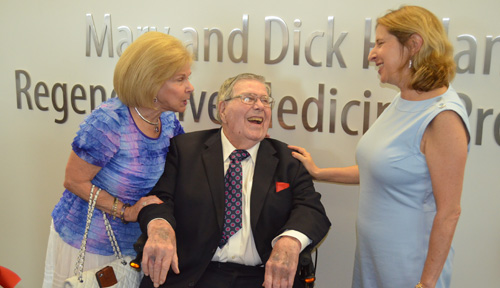Regenerative medicine — a research area that will dramatically impact health and change disease outcomes — got a big boost at UNMC with a gift from Mary and Dick Holland.
Calling himself “a living example of the need for regenerative medicine,” Holland used humor at the July ribbon-cutting ceremony of the Mary and Dick Holland Regenerative Medicine Program on the sixth floor of the Durham Research Center II.
Nora Sarvetnick, Ph.D., director of the regenerative medicine program, called Holland a passionate believer in regenerative medicine and research and said his gift would greatly impact the program, improving recruitment efforts and strengthening key initiatives.
UNMC supporter Mike Yanney called Holland “the single greatest difference-maker this city has.”
In the past several decades, Holland “has done a lot of things to change human lives,” Yanney said, citing his support not only of UNMC, but of cultural and educational institutions.
“I’ve never seen anyone like Dick Holland, who does it with flair, who does it with a lot of humor, and who never asks for anything in return,” Yanney said.
UNMC Chancellor Harold M. Maurer, M.D., called Holland and his late wife, Mary, “the epitome of giving.
“Without Dick and Mary, UNMC would not be where it is today,” he said. “They have supported construction of the Durham Research Centers, the Sorrell Center for Health Science Education, the Fred & Pamela Buffett Cancer Center, and many others, including the College of Public Health. We could not be more grateful to Mary and Dick for the gift to this regenerative medicine program.”
The regenerative medicine program brings together forward-thinking scientists and clinicians who are committed to understanding the basic science behind tissue engineering and development, Dr. Maurer said. The field involves innovative approaches that will enable the body to repair, replace, restore and regenerate damaged or diseased cells, tissues and organs.
Holland said such programs are needed in medicine today.
“The ability to build organs and change lives is a great tool,” Holland said. “I know this isn’t going to be a cinch.”
Dr. Sarvetnick will use the gift to recruit kidney, gastrointestinal and neural-cell experts.
“We want to augment UNMC’s strong clinical presence with basic science and bioengineering.”
